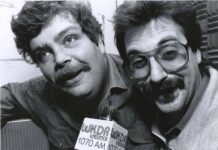
That’s the word from Wells Fargo analyst Davis Hebert who opened the Radio Show in Dallas with his insights on the economy and his thoughts on ad spend and how radio fits into what marketers and brands are doing to enhance their relationships with consumers.
Hebert said, despite the chatter, nobody really knows if a recession is coming. He says right now nearly all the economic flags are green; we’re in the 10th year of economic expansion and consumer spending is strong and unemployment is low. But, radio should be prepared to survive a recession and that means less debt.
Ad spending is also strong. Core ad spending will grow 6% in 2019 and 4% in 2020, according to Hebert’s stats. He said, “We’ve come fully back from the Great Recession.” Of course, as usual, digital is the major winner. Half of all ad spend now goes to some form of digital, according to Hebert, and it”s being taken from all traditional media. With all of the economic and ad spend growth, Hebert says radio is projected to be flat to up 1% in 2019 and 2020.
Hebert said the market is up 20% yet the radio index is down 12%.
The big question, year after year, is why. Why is radio struggling to grow revenue? Here’s what Hebert told Radio Ink after his presentation. “Advertisers are looking for more data-driven solutions, you may be familiar with the adage “you waste half your advertising dollars, you just don’t know which half” — I think they are focusing on data and being more specific. Radio is getting there in terms of being able to offer data-driven solutions but there is still a lot of progress to be made.”
Audio listening is at an all-time high thanks to new platforms like smart speakers, podcasts, and connected cars, yet radio’s ability to grow its share of the ad-dollar pie has been stuck in the mud for about a decade, still at about 6%. Hebert says radio is highly cyclical and exposed to economic headwinds. Ninety percent of radio revenue comes from traditional advertising while 10% is being generated from other platforms. So, he says, radio needs to stay focused on lowering its debt.
So, Hebert says the top issue facing at least the public sector of radio is deleveraging. Every radio company Hebert covers is higher than the 3-4X (EBITDA to debt ratio) he says they need to be at in order for investors to show any interest. He also mentioned every company is laser focused on getting to 4X or below. He said iHeartMedia, Cumulus, Entercom, Beasley, Radio One, and Townsquare are all over 4X and all of them are working hard to pay down debt and get under that number.
So we asked Hebert, what if tomorrow all the public companies were below that 4X number? What would that really mean for the industry? “I think it would give people a lot more comfort. You would see people feel more comfortable with the leverage point given the economic backdrop of potential for recession. It would make the radio space a safer place to invest.”






The way to do that, Jackson, is to make of radio a far more appealing medium – across the board, but especially in the areas of jock skills and commercial writing.
Being comfortable with a sector and being excited to invest in it are two very different things. Data will help…no question. But the real issue is that our customers (buyers, AE’s, local retailers, etc.) didn’t grow up listening to radio under their pillows at night….or cruising past the DQ with their radios blasting. Till we can find a way (and I don’t know what that is, be clear) to reconnect to our customers our struggles will continue.